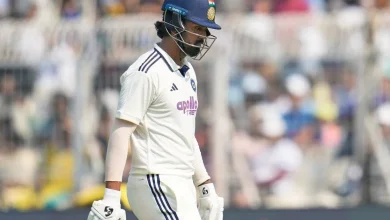Legendary NBA player, coach Wilkens dies at 88

Lenny Wilkens, a smooth playmaker who was inducted into the Basketball Hall of Fame as both a player and a coach, died Sunday. He was 88.
In a 15-year playing career, Wilkens was an All-Star nine times and twice led the league in assists. Gifted with extraordinary court sense, Wilkens was a player-coach for four seasons, three with the Seattle SuperSonics and one with the Portland Trail Blazers, before moving fulltime into coaching. He led the Sonics to the 1979 NBA title and was Coach of the Year in 1994.
Wilkens won 1,332 games — third-most all time — as coach of the Sonics, Trail Blazers, Cleveland Cavaliers, Atlanta Hawks, Toronto Raptors and New York Knicks before he retired in 2005. He coached 2,487 games, the most in NBA history. He also won an Olympic gold medal as coach of the 1996 U.S. team.
He is one of only five men to be inducted into the Naismith Basketball Hall of Famer as both player and coach, joining John Wooden, Bill Sharman, Tom Heinsohn and Bill Russell.
“Lenny Wilkens represented the very best of the NBA — as a Hall of Fame player, Hall of Fame coach, and one of the game’s most respected ambassadors,” NBA commissioner Adam Silver said in a statement Sunday. “So much so that, four years ago, Lenny received the unique distinction of being named one of the league’s 75 greatest players and 15 greatest coaches of all time.”
Lenny Wilkens #14 of the St. Louis Hawks drives past Hal Greer #15 of the Philadelphia 76ers during an NBA basketball game circa 1965 at Convention Hall in Philadelphia, Pennsylvania. Focus on Sport/Getty Images
A slight lefthander, barely 6 feet tall, Wilkens grew up in Brooklyn’s Bedford-Stuyvesant neighborhood in New York. His father was a chauffeur who died when he was 5; his mother worked in a candy factory. Wilkins didn’t play for his high school team until his senior season. His parish priest wrote to the athletic director at Providence College asking that Wilkens be considered for a scholarship despite his limited play. Wilkens ended up being the Friars’ first big star, a two-time All-American at Providence.
He led Providence to its first NIT appearance in 1959 and to the NIT finals in 1960. Wilkens’ No. 14 was retired in 1996, the first jersey ever retired by Providence College. In 2006, he was a member of the College Basketball of Fame’s inaugural class.
The St. Louis Hawks chose Wilkens in the first round of the 1960 draft. In his second season, he played only 20 games because of a military commitment, but he returned fulltime in 1962-63 and led the Hawks to six consecutive playoff appearances. In 1967-68, his last season with the Hawks, Wilkens finished second to Wilt Chamberlain in MVP balloting.
Wilkens was traded to the expansion SuperSonics in 1968. He averaged 22.4 points, 6.2 rebounds and 8.2 assists in his first season for the Sonics, and was an All-Star in three of his seasons for them.
Before the 1969-70 season, Sonics GM Dick Vertlieb asked Wilkens to become player-coach. “We went around and around,” he told the Boston Globe. “I told him no at first. I finally decided, what the heck, I had nothing to lose; I’d try it and see if I liked it. Everyone always said I was like a coach on the floor, anyway.”
In his third season as player-coach, the Sonics went 47-35, the first time in franchise history the team finished over .500.
Wilkens was traded to the Cleveland Cavaliers before the 1972-73 season, a move that was hugely unpopular in Seattle. He averaged 20.5 points and 8.4 assists for the lowly Cavaliers his first season and represented them in the 1973 All-Star Game. He spent his final season as player-coach for the Trail Blazers in 1974-75 before moving to coaching full time.
After a season as Portland’s fulltime coach, Wilkens returned to Seattle as coach in 1977-78, replacing Bob Hopkins, who started the season 5-17. Wilkens led the Sonics to the NBA Finals that season, where they lost to the Washington Bullets in seven games. He brought the Sonics back to the Finals in 1979, where they beat Bullets for Seattle’s first and only NBA title.
Lenny Wilkens holds up the NBA Championship trophy before some of the thousands of fans that lined in Seattle streets on Monday, June 4, 1979 in celebration of the Sonics victory over the Washington Bullets. AP Photo
Asked to explain how he related so well to players, Wilkens once told Newsday, “I know what young players are going through. I understand their backgrounds. I didn’t come from anything either, so I’ve been there.”
Wilkens coached four other franchises to the playoffs. In 1995 he set a record he thought would last forever when he passed Red Auerbach as the league’s all-time leader in coaching wins. He celebrated with a cigar.
“He was my standard. And so that’s why I lit that cigar up,: Wilkens said. “I never smoked a cigar in my life, you know and I lit it up and almost choked, but I wanted it as a tribute to Red Auerbach.”
He was ultimately passed by Don Nelson, who is second-all time with 1,335 wins, three more than Wilkens. Gregg Popovich had since passed both of them before retiring with 1,388 wins.
When Wilkens retired after coaching 32 seasons, he owned the all-time mark for wins, losses and games coached. He rarely had superstars on his teams. The only Hall of Famer Wilkens coached in his prime was Wilkens himself. .
“I’ve always believed you need balance,” he once said. “It’s not that I don’t want a star — I’ll always take a star — but even if you have a star, it’s important to surround him with the right kind of complementary players.”
Wilkens was inducted into the Naismith Basketball Hall of Fame in 1989 as a player. He went in as a coach in 1998 and continued to coach through the 2004-05 season. He was also inducted into the Hall in 2010 as an assistant coach for the 1992 Olympic Dream Team.
“Lenny didn’t dunk,” Sam Smith wrote in an ESPN column on Wilkens in 2002. “He was barely six feet tall and 175 pounds. He didn’t seem that fast, but he always got to the basket. He didn’t do anything to draw attention. He just scored or got the ball to someone to score. It was the way he later coached. No frills.
“Lenny also was tough, but he didn’t look it — because he was a pioneer. African-American kids weren’t offered many big-time basketball scholarships in 1956, and that’s one reason he ended up at Providence College. And when Wilkens took over the Sonics in 1969 as player-coach, African-Americans weren’t getting coaching opportunities.
“Wilkens didn’t shout for attention or demand it. He earned it with results, which is the way it should be. He never had stars, but he built winners. He rarely had the ultimate success, but his teams were always well prepared, effective, competitive and committed. No one could ask more of a coach. And few could ever do it better than Lenny Wilkens. “
Wilkens retired to Medina, Washington. For 17 years, he ran the NBA Coaches Association. His Lenny Wilkens Foundation has raised millions in Seattle where he remains beloved for bringing the SuperSonics a title.




